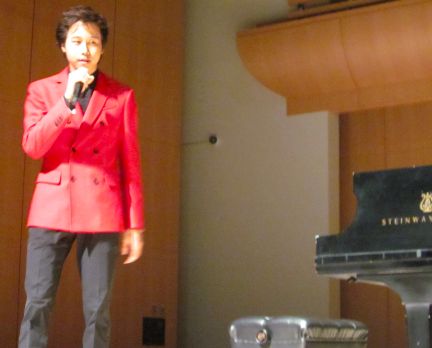|
Symphony
FROM THE NEW WORLD TO THE OLD WORLD
by Peter Lert
Saturday, June 14, 2025
Chamber
MC2 DUO RECITAL CLOSES 222'S SEASON
by Terry McNeill
Saturday, June 14, 2025
Choral and Vocal
CANTIAMO SONOMA'S LUSCIOUS A CAPELLA SINGING IN SEASON ENDING CONCERT
by Pamela Hicks Gailey
Sunday, June 8, 2025
Symphony
SRS SEASON ENDS WITH RESOUNDING TA-TA-TA-BANG
by Terry McNeill
Sunday, June 1, 2025
Symphony
YOUTHFUL VIRTUOSITY ON DISPLAY AT USO'S MAY CONCERTS
by Peter Lert
Saturday, May 17, 2025
Symphony
MYSTICAL PLANETS AND LIVELY GERSHWIN ORTIZ AT FINAL SRS CONCERT
by Peter Lert
Sunday, May 4, 2025
Symphony
VSO'S CONCERT MUSIC OF TIME, MUSIC OF PLACE
by Peter Lert
Sunday, April 27, 2025
VOCAL ELEGANCE AND FIRE AT THE 222'S RECITAL APRIL 26
by Pamela Hicks Gailey
Saturday, April 26, 2025
CANTIAMO SONOMA SINGS AN INSPIRED GOOD FRIDAY MOZART REQUIEM CONCERT
by Pamela Hicks Gailey
Friday, April 18, 2025
DRAMATIC SHOSTAKOVICH SYMPHONY CLOSES PHILHARMONIC'S 25TH SEASON
by Terry McNeill
Sunday, April 13, 2025
|
 |
 Steven Lin addressing Oct. 21 his Schroeder Hall Audience |
LIN'S PIANISM AND PERSONA CHARM SCHROEDER HALL AUDIENCE
by Terry McNeill
Sunday, October 21, 2018
In somewhat of a surprise a sold out Schroeder Hall audience greeted pianist Steven Lin Oct. 21 in his local debut recital. Why a surprise? Because Mr. Lin was pretty much unknown in Northern California, and Schroeder is rarely, very rarely sold out for a single instrumentalist.
But no matter, and the young Curtis Institute-trained artist played a conventional but thoroughly exciting concert that drew two standing ovations. He began with a piece that was in every amateur and professional pianist’s repertoire 120 years ago, but hasn’t been heard here for years - Mendelssohn’s Op. 14 Rondo Capriccioso. Mr. Lin teased the music with lots of little tempo changes, and gave an initial impression that he was going to be happiest this afternoon when his fingers were busiest. Part of the coda was played piano and he used the shift pedal over long stretches. It was good to hear an old warhorse played with such fervor and singularity.
Arrangements of four Gershwin Broadway tunes followed, and passed without much notice. These were not the familiar Earl Wild transcriptions, and I suspect given the bouncy and colorful character they were Mr. Lin’s creations. The best playing came in the slam bang “Oh Lady be Good” and the palm court waltz nature of “Strike Up the Band.” Gershwin’s immense popularity had little effect here.
Schumann’s eight-part Kreisleriana (Op. 16) was preceded by remarks from the stage by the pianist, as there were no program notes. Mr. Lin exhibited a charming connection with his audience, but segments of his descriptions and analogies seemed mostly sophomoric. The playing proved otherwise, as in the beginning ausserst bewegt his rhythmic authority and tone color generated by constant shift pedal use promised an exciting traversal of the 1838 work, written according to Mr. Lin in four days.
In this often bass-heavy music Mr. Linn made the most of orchestral sonorities in the sehr aufgeregt section and lots of muscular left-hand sforzandos. His octave and double-note technique was impressive throughout, and he provided lovely tonal control in the B Flat sehr langsam. The playing emphasized counterpoint and sporadic inner voices, and he pushed the tempo in sehr rasch to generate raucous effects. A light touch was heard in the finale with its offbeat accents, and the last chords were played softly, not staccato and with pedal.
After intermission remarks from the stage regarding humor in Beethoven’s music led into an ingratiating performance of the E-Flat Major “Hunt” Sonata, Op. 31, No. 3. Mr. Lin is right, as there is ample humor in this Beethoven, as well as the nearly contemporary C Major “Waldstein” Sonata’s first movement. His tempo in the opening allegro was decorous, in the mean between Radu Lupu’s recent soporific playing in Napa, and a more quick nervous speed. The pianist tended to be fussy and teasing with the rhythms, and used long fermatas at intervals, but his rapid-fire scales, shaped trills and passagework were immaculate. Staccato technique in the scherzo was equally impressive.
In the sprightly finale (presto con fuoco) the performance was again exciting but also idiosyncratic, and at places overplayed and inchoate. Contrasts were underscored at the expense of balance. That said, it was a virtuosic reading with distinct individuality and interest, and he clearly loves the work’s gaiety.
The recital closed with Liszt’s Mephisto Waltz No. 1, S. 110. There are three additional Mephisto Waltzes, written late in the composer’s life with complex harmonies, but virtuosos shun them and always opt for No. 1. Coincidentally I heard in an Oct. 12 recital the fastest Mephisto One (with light pedal) in my experience, and at times Mr. Lin’s speed approached the one from a Russian pianist in South Carolina. Mr. Lin captured the picturesque nature of the music in 11 minutes, and his right-hand skips, husky chord playing and stamina never failed him.
A standing ovation engendered more stage remarks, this time concerning a California couple that had helped Mr. Lin’s early career, and he dedicated his performance of Debussy’s Claire de Lune (from Suite Bergamasque) to them. The playing of the encore had a limpid tone and a stately tempo, and was a happy reprieve from the whirlwind force of the Liszt.
|

